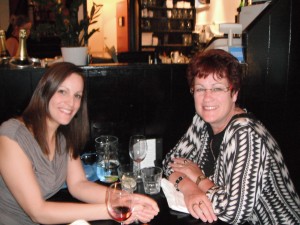Hello everyone,
I’m sure you’ve missed me 😉 Life has a funny habit of getting in the way at times, so I have been very silently on the blog lately. Now however, I am back, with a new piece of advice from one of your fellow students, Patricia, whom I’ve met in Zurich last summer. Time flies – it will be almost one year ago soon!
Anyway, neither myself nor the MALICs present at the dinner managed to convince Patricia to stand in for a short video, but she promised she’d send us something once she’s home, and she did! Patricia works as a Senior Digital Inclusion Specialist, and here’s what she had to say about her experiencing in MALIC, with a particular emphasis on reading for the modules:
Patricia – MALIC lesson learnt

“This was taken the weekend of her wedding last year, so a very happy time for us as we had a quiet mother/daughter meal together.” ~ Patricia, Sep’2011 cohort, Qatar
I will add to this what I also told Patricia on listening to her recording for the first time: in reality, it is difficult to give a generic piece of advice in what concerns reading. We are all different, and different types of learners read differently – one may be very comfortable skim-reading, while another will find that unless they read everything cover to cover they can’t make sense of it.
Just as I was preparing this post this morning a further discussion on this topic was taking place in the Induction module, where Mike, another MALIC “veteran”, had the following to say:
My experience is that in the beginning you try to read the books from cover to cover but I found that I quickly became overwhelmed and depressed at my lack of progress, so you need to learn to read differently.
I learned to take a topic in a book and read that and then look for similar topics in other books to get a range of opinions on that topic. Some you can read properly if it sounds valuable and some you scan looking for things of interest. Try also to read all the Introductions in each book to give them context.
Doing this means you can get through up to 25 books or articles in a module without have to read all of them completely. Only read what is relevant and what fits into the section you are researching using the Power Point slides in each unit as a guide. You will find things of interest not covered in the slides which is also good.
I always tried to thoroughly read the essential books and not so thoroughly the recommended books, but do look out for the recommended books marked with a # as they are usually very good.
Mike, Sep’2011 cohort, Papua New Guinea
